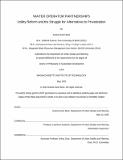Water Operator Partnerships : utility reform and the struggle for alternatives to privatization
Author(s)
Beck, Andrea Karin.
Download1193557198-MIT.pdf (3.725Mb)
Alternative title
WOPs : utility reform and the struggle for alternatives to privatization
Utility reform and the struggle for alternatives to privatization
Other Contributors
Massachusetts Institute of Technology. Department of Urban Studies and Planning.
Advisor
Lawrence Susskind.
Terms of use
Metadata
Show full item recordAbstract
The water privatizations that swept across the global South in the 1990s and early 2000s failed to meet expectations. Rather than bringing about increased efficiency and investment, a suite of public-private partnerships ended prematurely and caused social unrest, most notably in the Bolivian city of Cochabamba. In response, scholars and activists embarked on a search for "alternatives to privatization." Informed by the work of the Municipal Services Project and post neoliberal scholarship, this dissertation examines Water Operator Partnerships (WOPs) as a potential alternative to private-sector engagement in water and sanitation. Relying on primary documents and interviews, I trace the WOP concept to its origins in the UN system and highlight its defining characteristics as a partnership type. I further discuss the struggles behind the concept's emergence, focusing on the contested role of the private sector and the strategies applied by activists trying to safeguard a public orientation of WOPs. Based on two case studies of water companies in the Netherlands and Uganda, I examine the motivating factors that would cause water operators to engage in WOPs on a not-for-profit basis. My findings indicate that WOPs are driven by a number of interests that call into question their portrayal as solidarity-based partnerships, including staff development and the furthering of opportunities for aid, trade, and investment. I then follow the Dutch and Ugandan companies out of their headquarters and into the field, to the water utility serving Malawi's capital Lilongwe. Drawing on fieldwork in Malawi, I examine two WOPs in detail, showing how and why these partnerships failed or succeeded in supporting the reduction of non-revenue water. Taken together, this dissertation points to a need to refocus the debate on WOPs, beyond the private sector and towards public water and sanitation operators. I argue that two trends in particular deserve critical attention: professionalization and corporatization. Both are somewhat more concealed and less visible than the outright inclusion of the private sector in WOPs, but they could, in the end, pose a more serious challenge to the WOP model and its post neoliberal potential.
Description
Thesis: Ph. D., Massachusetts Institute of Technology, Department of Urban Studies and Planning, May, 2020 Cataloged from the official PDF of thesis. Includes bibliographical references (pages 155-175).
Date issued
2020Department
Massachusetts Institute of Technology. Department of Urban Studies and PlanningPublisher
Massachusetts Institute of Technology
Keywords
Urban Studies and Planning.